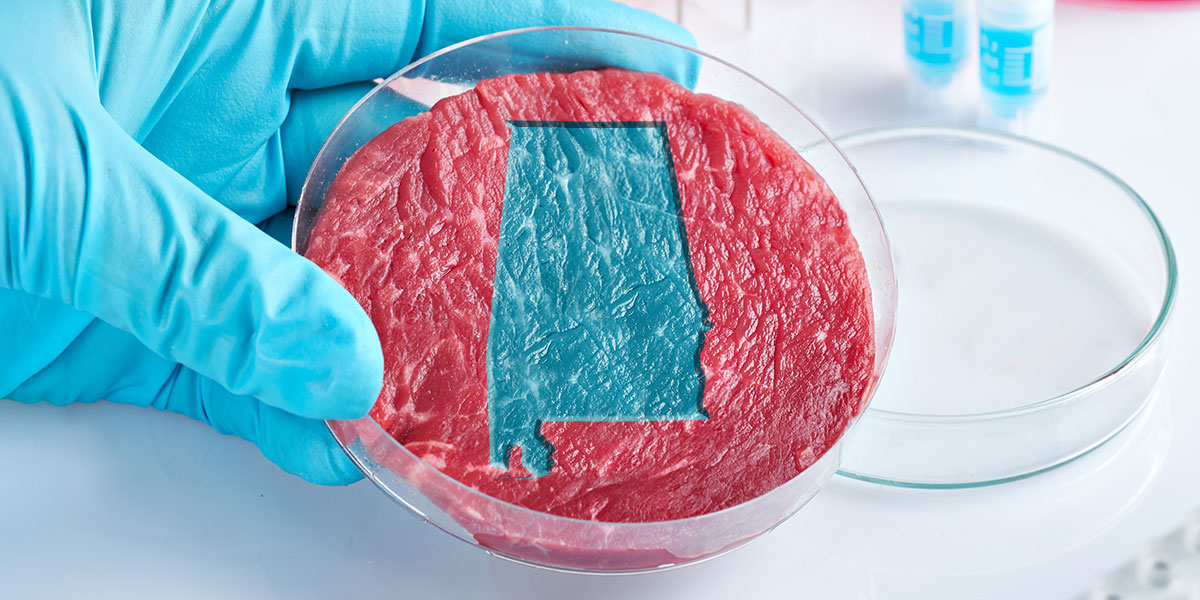Alabama’s ban on lab-grown meat became law on Oct. 1, 2024 and continues to gain the attention of lawmakers across the country, Michigan being the latest state to consider banning lab-grown meats.
According to a recent report from the Michigan Legislature, State Rep. Jim DeSana (R-Carleton) has introduced HB5879, to be heard by the Michigan House Agriculture Committee for consideration. As presented, HB5879 carries much of the same intentions that Alabama State Senator Jack Williams (R-Wilmer) used in creating Alabama’s law stopping the sale of meat style products that are generated in laboratories.
Williams has confirmed that he has been contacted about the pending bill in Michigan.
“I have been in communications with members of their legislature and they have the same concerns about this product as we do here in Alabama. There has not been enough research on this product and in my opinion, our bill is in place to protect the health and wellbeing of our citizens,” Williams said. “If a person wants it, they will find a way to get it and they can buy it from California if they want, but I am saying is that it doesn’t need to be in the stores in Alabama and there seems to be a lot of other people across this country that share the same opinion.”
Williams sponsored the bill in the 2024 session of the legislature and said he came up with the idea after a report was released stating that the U.S. Department of Agriculture had approved the sale of the product in the US.
While the product was labeled as “cell-cultivated meat” Williams gave it the name of “Frankenstein Meat”, something the senator says caught the attention of lawmakers not only in Alabama but in other states as well.
RELATED: Alabama becomes second state to ban lab-grown meat
“That was the best way I could think of to describe the product. The Frankenstein Monster was created in a laboratory to have the appearance of flesh and that is what was done here. So, in my mind, the name is appropriate,” Williams said. “One of the most important points that I make with this is that they use chemicals to create something that appears as meat and I’m told tastes like meat but there is no way anyone can convince me that putting all those chemicals into your body is healthy.”
Florida lawmakers developed a similar law soon after Williams announced his. The Senator advises that he was able to work with members of the Florida legislature as they were putting their bill together.
“The Florida bill was very similar to mine and we discussed a number of talking points about the bill as we were all seeking to get it passed into law,” Williams said. “I have been pleased to know that what I brought to the floor here in Alabama is now being discussed all over the country.
Williams said during his discussions with officials in other states he has warned them that the move to block the sale of the lab-grown meats was not popular among some groups in the country. Williams drew a lot of heat from out-of-state companies for supporting the legislation and at one point had his life threatened, which resulted in an Illinois man being taken into custody and charged with making death threats against Williams.
“I wanted them to know that I took on a lot of pressure to back away from this piece of legislation,” Williams said. “There were people from other states who came in here to argue against this bill. A California company sent representatives to stop the bill and discourage me from pushing it through. They didn’t like what I had to say but I stand by it.
“If you look at what is going on in California today, I don’t think there is anything they are doing that is better than what we are doing in Alabama. They might like lab-grown Frankenstein meat in California and that is fine. What I have always stood for and will continue to stand for is what I feel is best for the citizens of Alabama.”
The original bill called for a complete ban on the lab products but after hearing from NASA officials in Huntsville, Williams said he agreed to support an amendment allowing any federal, state or local government entity or an institution of higher education to conduct research on cultivated food products.
“After talking with representatives from our space program in Huntsville, I was in full agreement on the amendment,” Williams said. “The research they are doing is totally different than what I wanted to address.”
As explained in reports of the product, lab-grown meats are produced by using cells from living animals and placing them in a specialized container. While in a laboratory, the cells are grown into a product that looks and feels like the meat of the animal of which the cells were taken from, according to reports on cultivated food products.
RELATED: Law prohibiting the sale of lab-grown meat in Alabama moves forward
In June 2023, the first cell-cultivated chicken was approved for sale in the United States.
A 2023 report in the Congressional Research Service, the product showed that more than two-thirds of the 150 companies involved in cell-cultivated food products are located outside of the U.S., according to a 2023 report filed by the Congressional Research Service. The report also stated scientists have not developed the process well enough for the products to be sold in retail stores.
Williams said the lack of evidence showing the product is safe is another reason he wanted a ban on lab-generated meat.
“I don’t have confidence in this product that there will not be long-term effects from it,” he said. “If they are growing it in a lab, the way I see it, they are using chemicals to make it. The chemicals they are using are solutions that today they think are safe. I stress they think it is safe today but they have no clue what the doctors are going to say five or 10 years from now.”
Williams said the bill is a win for consumers and Alabama farmers.
“Alabama farms are the best resource that we have in our state and these farmers are facing enough trouble from the federal government, rising operating costs and low livestock prices,” Williams said. “They shouldn’t be burdened with the pressures of what is basically fake meat. Personally, I think the steps we took with this bill puts a little more focus on the health and safety of the food purchased in the meat section of our grocery stores.”
In reference to the pending bill in Michigan, Williams said he has agreed to attend a committee hearing and speak on the topic if needed.
Courtesy of Call News.











